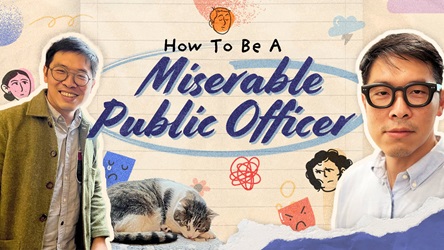Take Charge Of Your Career
Senior Director (Capabilities Development), Public Service Division, Prime Minister’s Office (2014 – present)
Asia Chief Information Officer and Director, Global Business Services, Procter & Gamble Asia (2007 – 2013)

DEAR YOUNG OFFICER,
I am perhaps newer than many of you to the Public Service, having only joined the Public Service Division in February 2014. But I have 26 years of experience in brand management, human resources (HR) and IT in the private sector.
I notice that many of you ask me what the private sector is like, and how it compares to the public sector. Perhaps some of you are even considering a job switch.
Implied in your questions is the notion that the private sector is a glamorous, exciting place to work in. Many of you seem to have a romanticised view. The truth is that work life can be very challenging in the private sector. The hours are long and you may have to work night shifts because of international business dealings.
My typical work day in the past would start as early as 7am at home for teleconference calls to the US. My second shift would be from 10am to 6pm in the office, before returning home for a quick dinner. Then, my third shift starts as I log on for night calls from 10pm to midnight. Typically, I would have up to four night calls per week.
What public officers may also take for granted is the face-to-face contact they enjoy with their colleagues and the people they serve. When I was in the private sector, a lot of meetings were conducted via video conference. This makes building relationships much more challenging.
That said, there is much that young public officers can learn from the private sector.

I also notice that young officers tend to defer to hierarchy a lot once they enter the Public Service. So my challenge to you is to remain inquisitive and questioning, and contribute. Don’t fade into the background.
As public officers, being accountable to citizens may be more challenging, but it is infinitely more meaningful. For instance, I feel that it is important for public officers to empathise with and help people from humble backgrounds.
For me, as I come from a poor family, I find that walking in the shoes of the under-privileged comes quite naturally to me. When I see construction workers hard at work, I will offer them cool drinks or snacks. At the MRT station, I once chatted with the staff directing human traffic and asked if she enjoyed her job. She told me that she gets scolded almost every day. I told her that she was making a difference and thanked her, and I could see tears well up in her eyes as I left for my train ride.
Another taxi uncle I chatted with told me that the opening of the Marina Coastal Expressway cost him $18 in extra ERP charges, as his passengers refused to pay for the charges incurred through his unfamiliarity. So I asked the HR Director from the Transport Ministry if they could introduce a grace period of no charges whenever a new ERP gantry is put up. In response, he said that the suggestion could be considered.
Being in touch, knowing the challenges faced in daily life by the people we serve and helping them is a delight. This has given me joy and fulfilment every day since I joined the public sector and I believe I have become a better person today because of the work I have chosen to pursue.
- POSTED ON
Jan 12, 2015
- TEXT BY
Lee Mui Ling
-
Work Better
Take Ownership Of Your Employability








dfc43633f22f6eceb9b0ff0000fcc945.tmb-tmb450x250.jpg)
